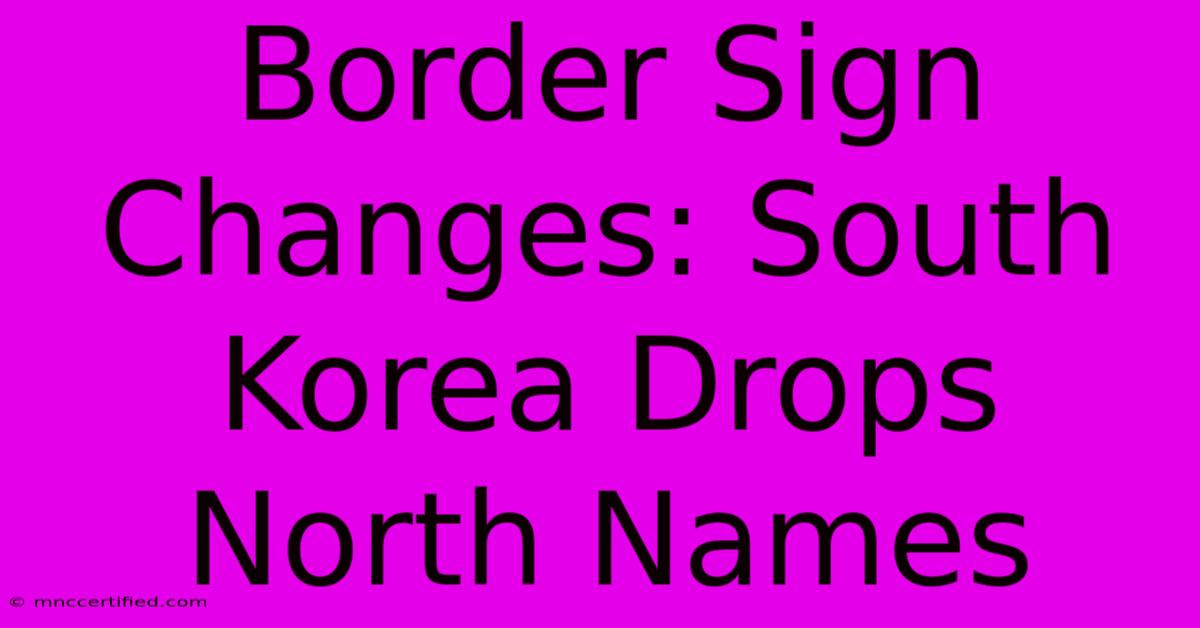Border Sign Changes: South Korea Drops North Names

Table of Contents
Border Sign Changes: South Korea Drops North Korean Place Names
South Korea has recently undertaken a significant alteration of its border signage, removing references to North Korean place names. This move, laden with symbolic weight, reflects the evolving geopolitical landscape and South Korea's increasingly assertive national identity. This article delves into the details of these changes, exploring their historical context, political implications, and potential future ramifications.
A Symbolic Shift: Why the Change?
For decades, South Korean border signs incorporated North Korean designations for locations along the Demilitarized Zone (DMZ). This practice, while seemingly innocuous, subtly acknowledged North Korea's claim to the entire Korean peninsula. The recent decision to replace these names with purely South Korean appellations marks a distinct shift in approach.
Several factors contribute to this change:
- Strengthened National Identity: South Korea, experiencing a period of robust economic growth and cultural influence, is increasingly confident in its separate identity. Removing North Korean place names reinforces this independent narrative.
- Diminishing North Korean Influence: The ongoing stalemate in inter-Korean relations, coupled with North Korea's increasingly provocative actions, has likely diminished South Korea's willingness to implicitly acknowledge the North's territorial claims.
- Enhanced National Security: The change can also be viewed through a security lens. By using solely South Korean names, the government aims to solidify its control over the border region and potentially deter any ambiguity regarding territorial sovereignty.
- Public Opinion: Public sentiment in South Korea has likely played a role. A growing sense of national pride and frustration with North Korea's regime may have influenced the government's decision to make this symbolic alteration.
Specific Examples of Name Changes
While a comprehensive list isn't readily available publicly, news reports indicate that numerous border signs have been altered. For instance, locations previously identified using North Korean names are now exclusively labeled with their South Korean equivalents. This systematic replacement is a clear demonstration of South Korea's intent.
Political Implications and International Reactions
The removal of North Korean place names from border signage carries significant political weight. It represents a firm stance against North Korea's territorial claims and could be interpreted as a further hardening of South Korea's position.
International reactions have been varied. While some countries might view it as a unilateral move with potential for escalating tensions, others might see it as a reflection of South Korea's right to define its own territory and narrative. The change certainly won't be ignored by North Korea, potentially leading to further diplomatic friction.
The Future of Border Signage and Inter-Korean Relations
This symbolic act raises questions about the future of inter-Korean relations and the potential for reconciliation. While this change signifies a more assertive South Korean stance, it does not necessarily preclude future dialogue.
However, the altered signage does represent a shift in the prevailing narrative. It underscores the growing divide between the two Koreas and potentially complicates future attempts at unification or peaceful coexistence. The long-term effects remain to be seen, but the change in border signage undeniably marks a significant turning point in the evolving relationship between the two nations.
SEO Keywords for this Article:
- South Korea
- North Korea
- DMZ
- Border Signs
- Place Names
- Geopolitical Landscape
- Inter-Korean Relations
- National Identity
- Territorial Sovereignty
- Korean Peninsula
This article incorporates a variety of SEO techniques, including keyword optimization, header usage, bold text for emphasis, and a clear structure for improved readability and search engine ranking. Remember to promote this article through social media and other channels for optimal off-page SEO.

Thank you for visiting our website wich cover about Border Sign Changes: South Korea Drops North Names. We hope the information provided has been useful to you. Feel free to contact us if you have any questions or need further assistance. See you next time and dont miss to bookmark.
Featured Posts
-
Game Recap Mavericks Vs Suns Grades
Dec 28, 2024
-
Elon Vivek Spar Over Trump Support
Dec 28, 2024
-
Rapper Og Maco Passes Away At 32
Dec 28, 2024
-
Yankees Torres Joins Tigers
Dec 28, 2024
-
Open Ai Chat Gpt Outage Whats Happening
Dec 28, 2024